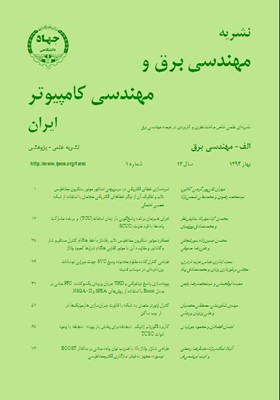کاربرد الگوریتم ژنتیک چندهدفه برای پخش بار بهينه چندهدفه با وجود ادوات TCSC
محورهای موضوعی : مهندسی برق و کامپیوتراحسان افضلان 1 * , محمود جورابیان 2
1 - دانشگاه شهید چمران اهواز
2 - دانشگاه شهید چمران اهواز
کلید واژه: پخش بار بهينه چندهدفه الگوريتم ژنتیک چندهدفه (V - MOGA) خازن سري کنترلشده با تايريستور (TCSC),
چکیده مقاله :
اين مقاله الگوریتم ژنتیک چندهدفه (V-MOGA) را براي بهينهسازي هزينه توليد، آلودگي و تلفات انتقال توان اکتيو در سيستمهاي قدرت مجهزشده به سيستمهاي انتقال ac قابل انعطاف (FACTS) ارائه ميکند. در رويکرد پيشنهادی، مسأله پخش بار بهينه به عنوان يک مسأله بهينهسازي چندهدفه فرمولبندي گردیده و ادوات FACTS در نظر گرفته شده شامل خازن سري کنترلشده با تايريستور (TCSC) است. رويکرد پيشنهادي روي یک سيستم تست 57باسه آزمايش شده و نتايج به دست آمده از رويکرد پيشنهادي با نتايج به دست آمده از روشهاي NSGA - II و MODE مقايسه شدهاند.
This paper ε-multi objective genetic algorithm variable (εV-MOGA) to optimize cost of generation, emission and active power transmission loss of flexible ac transmission systems (FACTS) device-equipped power systems. In the proposed approach, optimal power flow problem is formulated as a multi-objective optimization problem. FACTS devices considered include thyristor controlled series capacitor (TCSC). The proposed approach has been examined and tested on the modified IEEE 57-bus test system. The results obtained from the proposed approach have been compared with those obtained from nondominated sorting genetic algorithm-II, multi-objective differential evolution.
[1] J. A. Momoh, M. E. El - Hawary, and R. Adapa, "A review of selected optimal power flow literature to 1993, part I: nonlinear and quadratic programming approach," IEEE Trans. Power Syst., vol. 14, no. 1, pp. 96-104, Feb. 1999.
[2] J. A. Momoh, M. E. El - Hawary, and R. Adapa, "A review of selected optimal power flow literature to 1993, part II: newton, linear programming and interior point methods," IEEE Trans. Power Syst., vol. 14, no. 1, pp. 104-111, Feb. 1999.
[3] N. G. Hingorani and L. Gyugyi, Understanding FACTS: Concepts and Technology of Flexible AC Transmission Systems, New York: IEEE Press, 1999.
[4] W. Ongsakul and P. Bhasaputra, "Optimal power flow with FACTS devices by hybrid TS/SA approach," Electr Power Energy Syst, vol. 24, no. 1, pp. 851-857, 2002.
[5] J. H. Talaq, F. El - Hawary, and M. E. El - Hawary, "A summary of environmental/economic dispatch algorithms," IEEE Trans. Power Syst., vol. 9, no. 3, pp. 1508-1516, Aug. 1994.
[6] D. Srinivasan, C. S. Chang, and A. C. Liew, "Multiobjective generation scheduling using fuzzy optimal search technique," IEE IEE Proceedings – C: Generation, Transmission and Distribution, vol. 141, no. 3, pp. 233-242, May 1994.
[7] A. Farag, S. Al - Baiyat, and T. C. Cheng, "Economic load dispatch multiobjective optimization procedures using linear programming techniques," IEEE Trans. Power Syst., vol. 10, no. 2, pp. 731-738, May 1995.
[8] D. B. Das and C. Patvardhan, "New multi - objective stochastic search technique for economic load dispatch," IEE IEE Proceedings – C: Generation, Transmission and Distribution, vol. 145, no. 6, pp. 747-752, Nov. 1998.
[9] D. A. V. Veldhuizen and G. B. Lamont, "Multiobjective evolutionary algorithms: analyzing the state-of-the-art," Evolutionary Computation, vol. 8, no. 2, pp. 125-147, Jun. 2000.
[10] E. Zitzler, M. Laumanns, and L. Thiele, "Improving the strength pareto evolutionary algorithm, Swiss Federal Institute of Technology (ETH), Zurich, Switzerland, Technical Report TIK - Report 103, May 2001.
[11] H. A. Abbass and R. Sarker, "The pareto differential evolution algorithm," Int J. Artif Intell Tools, vol. 11, no. 4, pp. 531-552, Dec. 2002.
[12] K. Deb, A. Pratap, S. Agarwal, and T. Meyarivan, "A fast and elitist multiobjective genetic algorithm: NSGA-II," IEEE Trans. Evol Comput., vol. 6, no. 2, pp. 182-197, Apr. 2002.
[13] B. V. Babu and B. Anbarasu, "Multi - objective differential evolution (MODE): an evolutionary algorithm for multi - objective optimization problems (MOOPs)," in Proc. of 3rd Int. Conf. on Computational Intelligence, Robotics, and Autonomous Systems, CIRAS'05, Singapore, Dec. 2005.
[14] K. V. Price, R. Storn, and J. Lampinen, Differential Evolution: A Practical Approach to Global Optimization, Berlin: Springer- Verlag, 2005.
[15] M. A. Abido, "Environmental/economic power dispatch using multiobjective evolutionary algorithm," IEEE Trans. Power Syst., vol. 18, no. 4, pp. 1529-1537, Nov. 2003.
[16] M. A. Abido, "Multi - objective evolutionary algorithms for electric power dispatch problem," IEEE Trans. Evol Comput, vol. 10, no. 3, pp. 315-329, Jun. 2006.
[17] S. Agrawal, B. K. Panigrahi, and M. K. Tiwari, "Multiobjective particle swarm algorithm with fuzzy clustering for electrical power dispatch," IEEE Trans. Evol Comput, vol. 12, no. 5, pp. 529-541, Oct. 2008.
[18] X. Hugang, C. Haozhong, and L. Haiyub, "Optimal reactive power flow incorporating static voltage stability based on multi - objective adaptive immune algorithm," Energy Convers Manage, vol. 49, no. 5, pp. 1175-1181, May 2008.
[19] T. Niknam, M. R. Narimani, M. Jabbari, and A. R. Malekpour, "A modified shuffle frog leaping algorithm for multi - objective optimal power flow," Energy, vol. 36, no. 11, pp. 6420-6432, Nov. 2011.
[20] M. Joorabian and E. Afzalan, "Optimal power flow under both normal and contingent operationconditions using the hybrid fuzzy particle swarm optimisation and Nelder - Mead algorithm (HFPSO - NM)," Applied Soft Computing, pt. C, vol. 14, pp. 623-633, Jan. 2014.
[21] D. C. Walters and G. B. Sheble, "Genetic algorithm solution of economic dispatch with valve point loading," IEEE Trans. Power Syst, vol. 8, no. 3, pp. 1325-1332, Aug. 1993.
[22] R. Yokoyama, S. H. Bae, T. Morita, and H. Sasaki, "Multiobjective optimal generation dispatch based on probability security criteria," IEEE Trans. Power Syst, vol. 3, no. 1, pp. 317-324, Feb. 1988.
[23] M. Laumanns, L. Thiele, K. Deb, and E. Zitzler, "Combining convergence and diversity in evolutionary multi-objective optimization," Evolutionary Computation, vol. 10, no. 3, pp. 263-282, Fall 2002.
[24] M. Basu, "Economic environmental dispatch using multi - objective differential evolution," Applied Soft Computing, vol. 11, no. 1, pp. 2845-2853, Mar. 2011.

